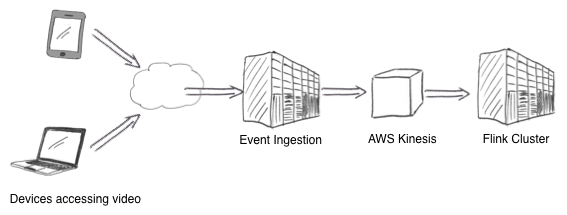Flink Forward San Francisco Preview: Real-time Anomaly Detection with Mux
Last month, software engineer Scott Kidder (@hexdumpster) of Mux published a popular post on his company's blog titled "Discovering Anomalies in Real-Time with Apache Flink". The post covered Mux's process for adding anomaly-detection alerting to its product, starting with evaluating different streaming frameworks through to which Apache Flink® operators are used in the application.

A diagram from the Mux post
Lucky for all of us, the blog post was just a preview of things to come, and Scott will be presenting on the topic at the first-ever Flink Forward in San Francisco on April 11. From his talk's abstract:
Mux uses Apache Flink to identify anomalies in the distribution & playback of digital video for major video streaming websites. Scott Kidder will describe the Apache Flink deployment at Mux leveraging Docker, AWS Kinesis, Zookeeper, HDFS, and InfluxDB. Deploying a Flink application in a zero-downtime production environment can be tricky, so unit- & behavioral-testing, application packaging, upgrade, and monitoring strategies will be covered as well.
His talk is timely, both because of Flink's increasing popularity in real-time alerting & anomaly detection applications and because of his discussion of deployment-related issues--an area where much is happening in the Flink community.
San Francisco-based Mux is a Y Combinator graduate whose product provides monitoring and analytics for streaming video. The company was founded by experts in the space from the likes of Brightcove and Zencoder, and Scott himself has been working with video for more than 10 years. By the way, they're hiring.
To see Scott's talk along with 25 others, buy your ticket to Flink Forward San Francisco today. P.S. For more recommended reading, Scott also published a nice piece about using Flink's Amazon Kinesis connector and building the connector source. Check it out.

You may also like

Preventing Blackouts: Real-Time Data Processing for Millisecond-Level Fault Handling
Leverage real-time data processing for instant power outage detection. Im...

Real-Time Fraud Detection Using Complex Event Processing
Real-time fraud detection with Complex Event Processing helps identify su...

Meet the Flink Forward Program Committee: A Q&A with Erik Schmiegelow
Discover insights from Erik Schmiegelow of Hivemind on the importance of ...

Meet the Flink Forward Program Committee: A Q&A with Yuan Mei
Discover Yuan Mei's insights on streaming data, state management, and the...















